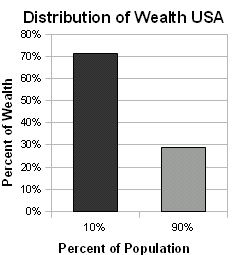"There are two ideas of government. There are those who believe that if you just legislate to make the well-to-do prosperous, that their prosperity will leak through on those below. The Democratic idea has been that if you legislate to make the masses prosperous their prosperity will find its way up and through every class that rests upon it." William Jennings Bryan, 1896
Populism is broadly defined as "political ideas and activities that are intended to represent ordinary people's needs and wishes." The majority are deliberately held down by the financial elite. Removal of the financial elite is the vehicle to realize the "people's needs and wishes." (Graph)
The statement from William Jennings Bryan is pure populism. It becomes less pure as he proceeded with his speech. He used a metaphor of burning down the nation's big cities since they were, he claimed, the stronghold of the financial elite and support for the gold standard for currency.
In practice, populism almost always entails anger and resentment.
A combination of factors has the United States ripe for populist sentiments. The financial collapse which surfaced fully at the end of the Bush administration resulted in help to both the major financial firms and the people. The financial firms got $14 trillion dollars worth of bailouts. The people got $1.8 trillion in President Obama's stimulus package, much of which consisted of tax cuts for political favorites.
On a more basic level, the disparity in wealth shows that the top just 5% of the population controls 59% of the nations wealth. Include the next 5% and you find that 10% of the population controls 71% of the wealth. The parties and the media can trot out all the diversions they want, people know this and they're increasingly upset as the recession/depression bears down on the vast majority of citizens.
Major Populist Efforts in the Past
Bryan's Cross of Gold speech of 1896 expressed agrarian populism at a time when large portion of the people lived and worked in rural areas. It was at the expense of working class people in cities, thus denying a unified movement of those at the bottom of the financial ladder.
Bryan is a good model of how populist politicians operate. They divide the the working class and poor by race or locality and then enunciate the message of class exploitation tailored to the target subgroup, in this case rural citizens.
Georgia's populist governor, Thomas E. Watson, a contemporary of Bryan, went so far as to establish the Populist Party (People's Party). This met with some success but, like Bryan, Watson retreated to race baiting since his cause was ultimately his own political aggrandizement.
One of the few populists who might have been competitive in a national campaign was Huey Long, the Governor then Senator from Depression era Louisiana. His populist message was clear and he spoke to all citizens without geographic or racial division:
"According to the tables which we have assembled, it is our estimate that four percent of the American people own eighty five percent of the wealth of America, and that over 70 percent of the people of America don't own enough to pay for the debts that they owe.
"How many men ever went to a barbecue and would let one man take off the table what's intended for 9/10th of the people to eat? The only way to be able to feed the balance of the people is to make that man come back and bring back some of that grub that he ain't got no business with!" Huey P. Long, Dec. 11, 1934
(Note: You can view every article as one long page if you sign up as an Advocate Member, or higher).






